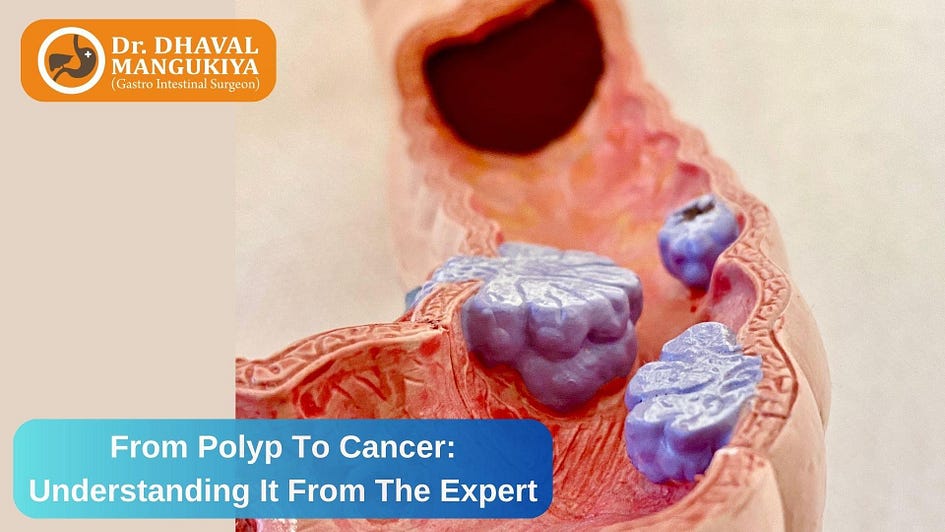From Polyps to Cancer: Understanding It From The Best Colorectal Surgeon In Surat

Colorectal health is a topic that many people find uncomfortable to discuss, but it’s crucial to understand the importance of early detection and treatment when it comes to colorectal issues. From benign polyps to life-threatening cancers, a colorectal surgeon plays a vital role in diagnosing, treating, and preventing these conditions. In this blog post, Dr Dhaval Mangukiya, one of the Best colorectal surgeons in Surat explains about the poly and its relation to colorectal cancer.
Understanding Colorectal Polyps
Colorectal polyps are small growths that develop on the inner lining of the colon or rectum. While most polyps are benign, some can develop into cancer over time. There are several types of polyps, including:
- Adenomatous polyps (adenomas): These are the most common type and have the highest risk of becoming cancerous.
- Hyperplastic polyps: Generally considered low risk, but can sometimes develop into cancer.
- Inflammatory polyps: Usually a result of inflammatory bowel disease and typically don’t become cancerous.
Most people with polyps don’t experience any symptoms, which is why regular screenings are essential. When symptoms do occur, they may include rectal bleeding, changes in bowel habits, or abdominal pain.
The Role of a Colorectal Surgeon in Polyp Management
Colorectal surgeons are specialists trained to diagnose and treat diseases of the colon, rectum, and anus. When it comes to polyps, their role includes:
- Screening and Detection: Colorectal surgeons perform or interpret various screening tests, such as colonoscopies, to detect polyps early.
- Polyp Removal: During a colonoscopy, the surgeon can remove most polyps immediately. This procedure, known as a polypectomy, is usually painless and can prevent the polyp from potentially developing into cancer.
- Biopsy and Analysis: After removal, polyps are sent to a laboratory for analysis to determine their type and whether they contain any cancerous cells.
- Follow-up Care: Based on the type and number of polyps found, the surgeon will recommend an appropriate follow-up schedule for future screenings.
The Progression from Polyps to Cancer
“Not all polyps become cancerous, but nearly all colorectal cancers start as polyps”, share the best gastro intestinal surgeons in Surat, Dr. Dhaval Mangukiya. The progression from a benign polyp to cancer typically takes several years, which is why regular screenings are so effective in preventing cancer.
The risk factors for developing colorectal cancer include:
● Age (risk increases after 50)
● Family history of colorectal cancer or polyps
● Personal history of inflammatory bowel disease
● Lifestyle factors such as diet, obesity, smoking, and alcohol consumption
Colorectal Cancer: Diagnosis and Treatment
When polyps do develop into cancer, early detection is crucial for successful treatment. Colorectal surgeons play a central role in diagnosing and treating colorectal cancer:
- Diagnosis: In addition to colonoscopy, surgeons may use other diagnostic tools such as CT scans, MRIs, or PET scans to determine the extent of the cancer.
- Staging: The surgeon will determine the stage of the cancer, which is crucial for planning treatment.
- Surgery: For most colorectal cancers, surgery is the primary treatment. Colorectal surgeons use various techniques, including minimally invasive laparoscopic surgery and robotic-assisted surgery, to remove the cancerous tissue while preserving as much healthy tissue as possible.
- Collaboration: Colorectal surgeons work closely with oncologists and other specialists to provide comprehensive care, which may include chemotherapy or radiation therapy in addition to surgery.
- Follow-up Care: After treatment, the surgeon will continue to monitor the patient for recurrence and manage any long-term effects of treatment.
Prevention and Early Detection: The Key to Colorectal Health
According to the best gastro intestinal surgeons in Surat, the best way to prevent colorectal cancer is through regular screenings and lifestyle modifications. These surgeons recommend:
- Regular Screenings: Most people should begin colorectal cancer screening at age 45, or earlier if they have risk factors.
- Healthy Lifestyle: Maintaining a healthy weight, eating a balanced diet rich in fruits and vegetables, exercising regularly, limiting alcohol consumption, and avoiding smoking can all reduce the risk of colorectal cancer.
- Knowing Your Family History: If you have a family history of colorectal cancer or polyps, inform your doctor, as you may need to start screenings earlier.
The Importance of Seeking Expert Care
While the topic of colorectal health can be uncomfortable, it’s crucial not to ignore symptoms or delay screenings. Colorectal surgeons are highly trained experts who can provide compassionate care and state-of-the-art treatment for a wide range of colorectal issues.
From removing potentially dangerous polyps to performing complex cancer surgeries, colorectal surgeons play a vital role in maintaining colorectal health and saving lives. By working closely with these specialists and following their recommendations for screening and prevention, you can significantly reduce your risk of colorectal cancer and ensure early detection and treatment if issues do arise.
Remember, when it comes to colorectal health, knowledge, prevention, and early detection are your best defenses. Don’t hesitate to reach out to a colorectal surgeon or the best gastro surgeon in Surat if you have concerns or are due for a screening. Your future self will thank you for taking this important step in protecting your health.
Comments
Post a Comment